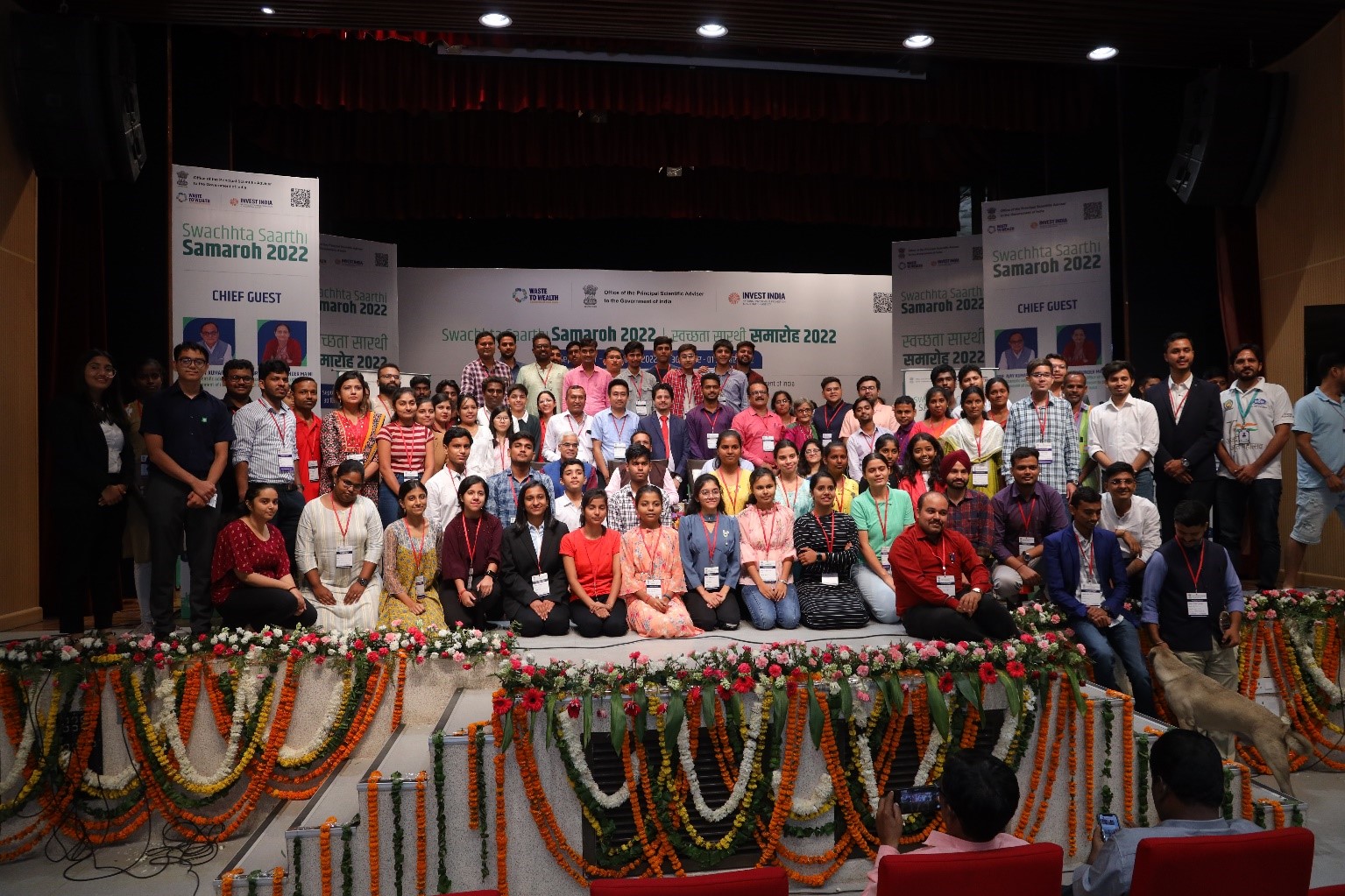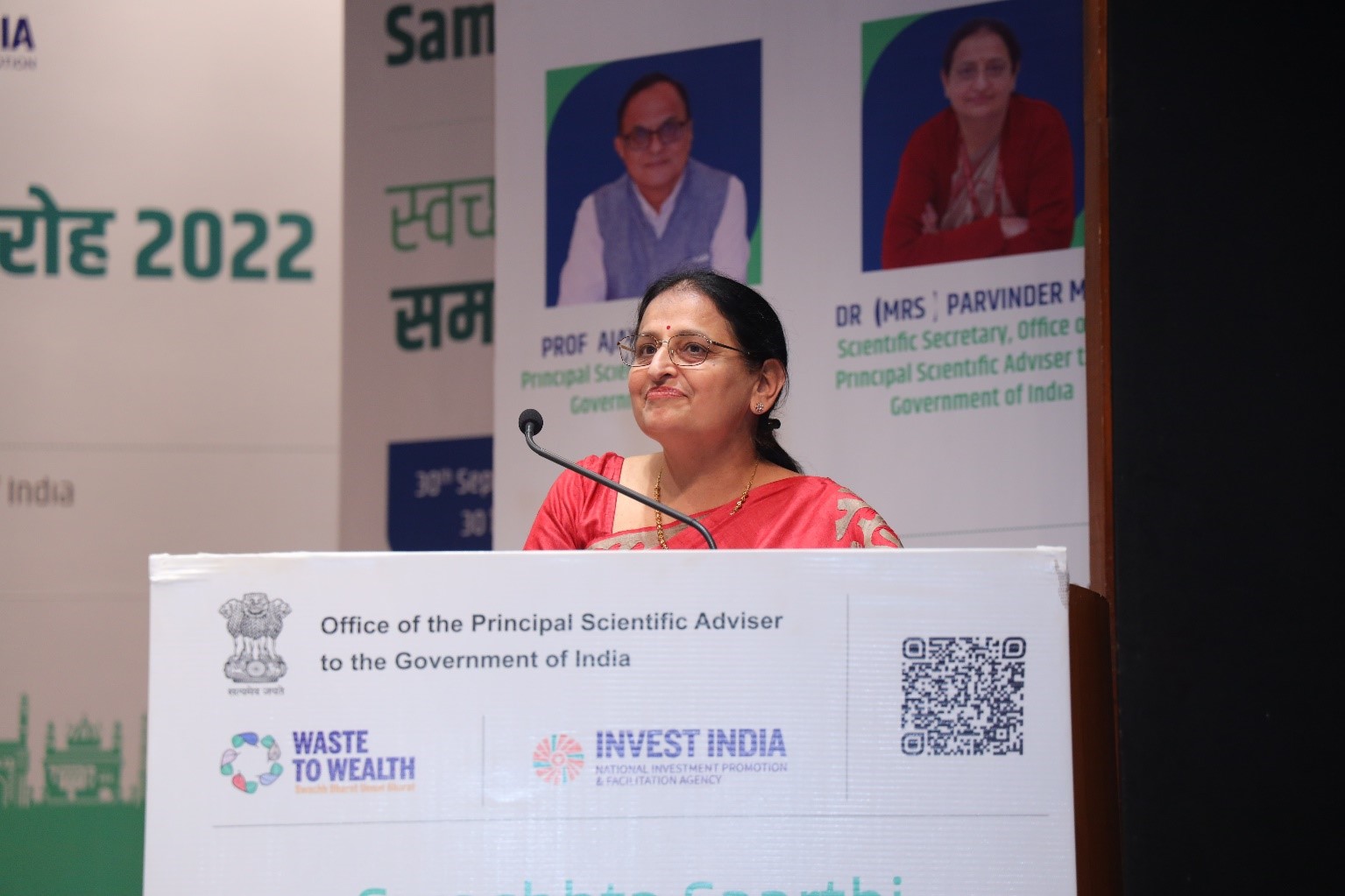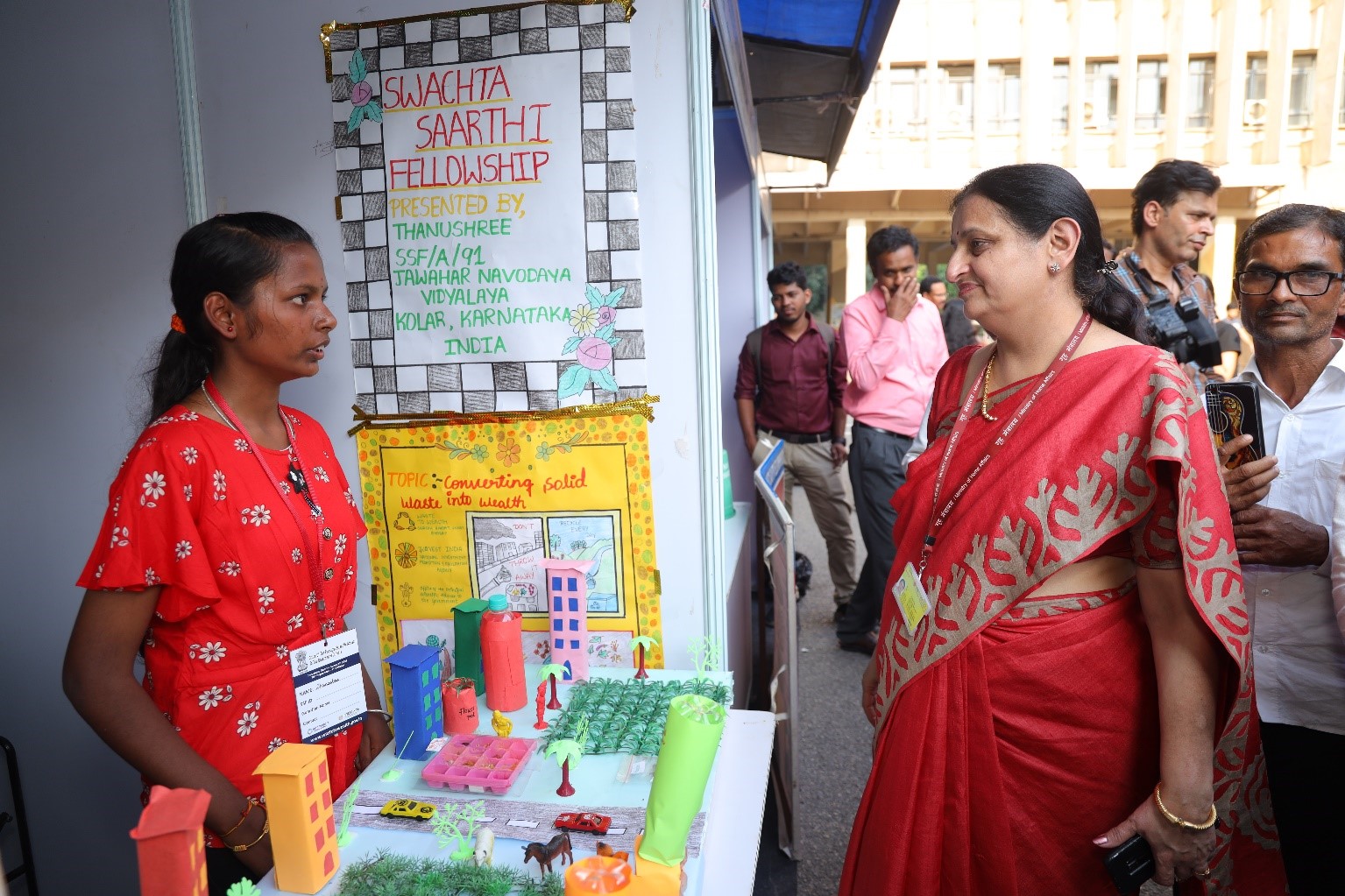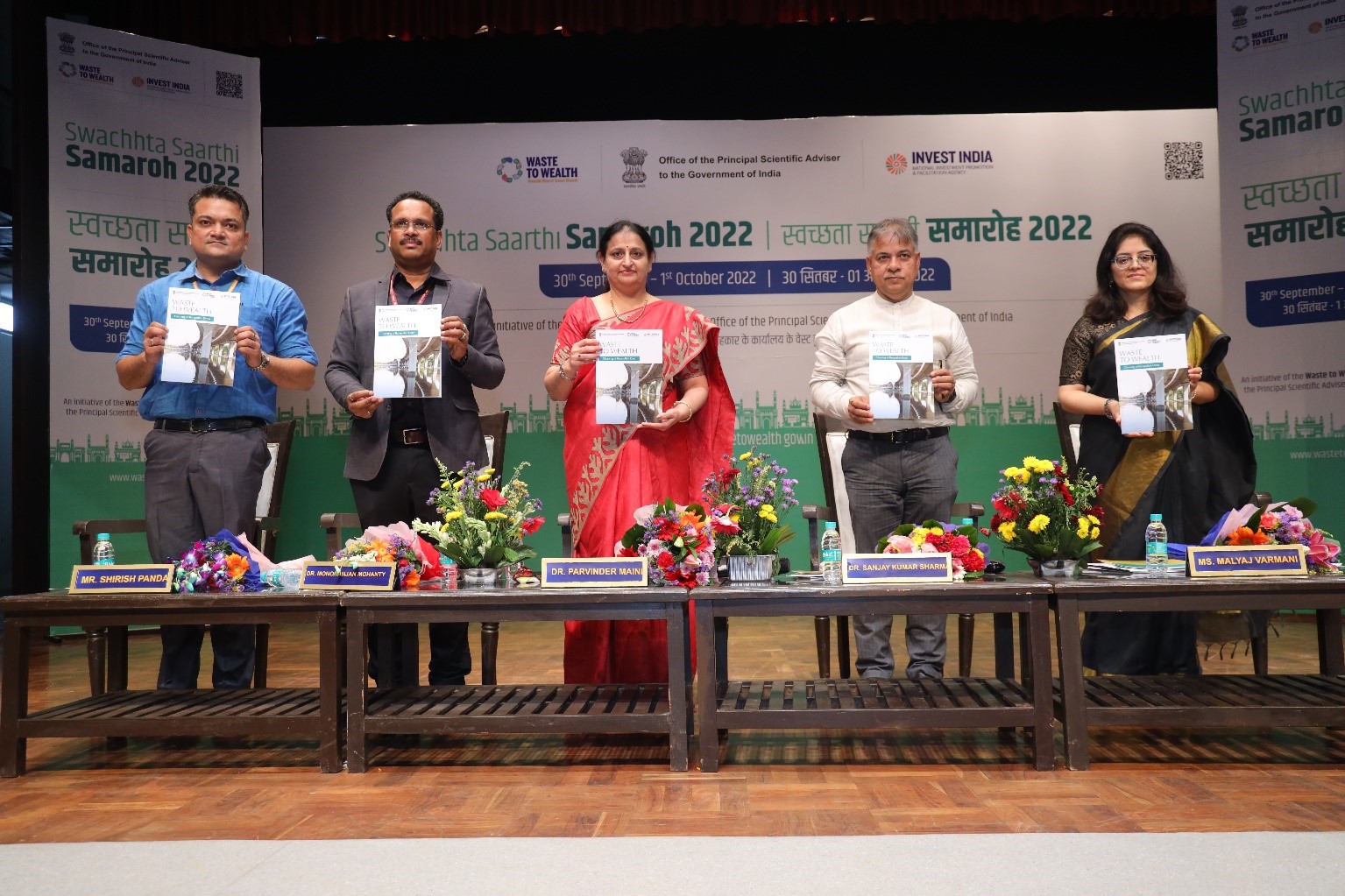
- A+
- A
- A-

SSF Fellows and guests at the closing ceremony of the Swachhta Saarthi Samaroh 2022
Waste management is a major cause of concern in India, owing to the failure of local authorities in managing high quantities of waste, especially in urban areas. Approximately 50 million metric tonnes of municipal solid waste is generated in India each year, with urban cities generating between 1,30,000 to 1,50,000 metric tonnes every day. The Waste to Wealth Mission is one of the many initiatives by the Government of India which aims to address waste management concerns in the country.
Waste to Wealth is one of the nine scientific missions of the Prime Minister’s Science, Technology, and Innovation Advisory Council (PMSTIAC), spearheaded by the office of the Principal Scientific Adviser (PSA), Government of India. The aim of the mission is to identify, develop, and launch technologies to recycle and treat waste and use it to generate energy and other valuable resources.
As part of this mission, the Swachhta Saarthi Fellowship—a fellowship programme to facilitate community participation in the micro-management of solid waste—was launched in 2021, in association with Invest India. The fellowship empowers people engaged in community waste management as “Swachhta Saarthis,” who in turn increase community participation to spread awareness about waste management, conduct real-time surveys to understand the status of waste management in their localities, and develop different methods to help solve the crisis.
The year-long fellowship has three categories, and is awarded to students, community workers, self-help groups, and municipal/sanitary workers who are trying to design sustainable and eco-friendly solutions for waste management. The categories are as follows:
• Category A: Open to school students from 9th to 12th standard, who are engaged in community waste management;
• Category B: Open to college students (undergraduate, post-graduate, and research students) engaged in community waste management; and
• Category C: Open to citizens working in the community and through Self-Help Groups (SHGs), and municipal and sanitary workers working beyond their job requirements.
On September 30 and October 1, 2022, the ‘Swachhta Saarthi Samaroh 2022’ was organised to recognise the first cohort of Swachhta Saarthi Fellows (SSFs) who have worked on waste management projects for a year. Held at the Indian Institute of Technology (IIT), New Delhi, the two-day event saw 120 fellows recognised and felicitated for their incredible work.
The event began with Ms. Malyaj Varmani, the Vice President of Invest India, formally congratulating and welcoming the Fellows and their families to the event. She then invited Dr. Monoranjan Mohanty, Scientist G/Adviser at the Office of the PSA to the Government of India, to come onstage to speak to the Fellows. “All the Fellows have played an enormous role in sensitising the communities on waste management. I want to push you to think of cost-effective and easily accessible technologies to convert this waste to wealth,” emphasised Dr. Mohanty during his welcome address.
The Chief Guest of the event, Dr. Parvinder Maini, Scientific Secretary at the Office of the PSA to the Government of India, congratulated the Fellows for contributing to India's waste management efforts in her speech. “You have been selected for your innovative ideas and determination to do something good for the country and the world. I salute every one of you for the commendable work you have done. The originality of your ideas and the will to demonstrate your work for a more significant cause shows your undaunted commitment to addressing waste management,” she remarked.

Chief guest Dr. (Mrs.) Parvinder Maini addressing SSF Fellows
Another esteemed guest, Dr. Sanjay Kumar Sharma, a Professor at IIT BHU, spoke about the responsibility that Swachhta Saarthi Fellows carry. “Development and destruction go hand-in-hand, and it is our responsibility to stop that. As Swachhta Saarthis, the Indian government has given you the responsibility to be agents of change, who encourage cleanliness in your community,” he advised.
The Fellows were also given a chance to share their personal experiences surrounding waste management within their communities. For instance, Aashima Jha, who is a Category B Fellow, observed a new health hazard during the COVID-19 pandemic: face masks and personal protective equipment being discarded by people in public spaces. She decided to do something about it and started upcycling discarded face masks to create planters, to grow saplings from vegetables and fruits. A Fellow from Category C, Veerbhadra Swamy, spoke about how he spread awareness on waste segregation in a small district in Karnataka. Despite being physically challenged, Veerbhadra would walk for several kilometres every day to conduct workshops and training sessions. Sharing these experiences helped the guests of the event better understand the Fellows’ perspectives of the programme, and how it has benefitted them.
Although there were several other activities, the major attraction of the two-day event was the exhibition set up by the Fellows to display their projects. Apart from the exhibition, workshops were organised for each category of Fellows on the first day of the event, to give them a chance to interact with various stakeholders in the waste management industry.

Dr. (Mrs.) Parvinder Maini at the exhibition set up by the SSF Fellows
For Category A fellows, a Foldscope Microscopy Workshop was organised, which was an initiative by the Department of Biotechnology, Ministry of Science and Technology, Government of India. Super mentors including Dr. Uma Chaudhary, Dr. Rafikh Shaikh, and Mr. Mo Pandiarajan taught the Fellows not only how to build a Foldscope, but also how to use one for daily science experiments. The workshop was a fantastic way to broaden the minds of the students and encourage them to explore scientific waste management methods.
Category B and Category C Fellows also got to interact with Mr. Manish Dabkara, International Carbon Markets Leader, and Chief Managing Director (CMD) and Chief Executive Officer (CEO) of EKIESL, on the “Overview on Carbon Credit and Sustainable Future.” The Fellows are already involved in community-based solutions to negate carbon emissions, and thus, were especially interested in learning about the benefits of mass projects to avail carbon credits and on participating in the emerging carbon market.
Additional events on the first day included an interactive session on “Applying the Technology-Business-Design Approach to create Wealth from Misplaced Resources,” conducted by Dr. Vijayraghavan Chariar, who is a Professor at the Centre for Rural Development and Technology, IIT Delhi, the Co-founder of JoyisYou, and the Chairman of Ekam Eco Solutions. This event provided the Fellows with a platform to discuss ethical ways to start a waste management business and core practices that need to be followed to create a more significant impact on the community and the environment.
A riveting panel discussion on "Entrepreneurship Opportunities in Waste Management" was also held, and included Ms. Shipra Mishra, CEO and Managing Director (MD) of City Knowledge Innovation Cluster, Delhi Research, Implementation, and Innovation (CKIC-DRIIV); Mr. Nick Booker, Founder of IndoGenuis; and Mr. Apurv Misal, Marketing Head of Phool.co. They interacted with the Fellows and answered their queries surrounding entrepreneurship in waste management. The case study on Phool.co—a business selling incense sticks made from flowers polluting the water bodies of Kanpur—proved to be highly inspirational for the Fellows.
On the second day, the Guest of Honour, Dr. Bhagwan Singh Chaudhary, a Professor at Kurukshetra University, Haryana, addressed the SSFs, saying, “I congratulate the Office of the PSA to the Government of India and Invest India for bringing fellows from across the country to this platform. I would like to mention to all the Fellows that this is not the end of your association with us. Your association with the Government of India is valued, and you are ambassadors of the Office of the PSA to the Government of India.”

Mr. Shirish Panda, Scientist “D”, Office of the Principle Scientific Adviser to the Government of India; Dr. Monoranjan Mohanty, Scientist G/Adviser, Office of the Principle Scientific Adviser to the Government of India; Dr. (Mrs.) Parvinder Maini, Scientific Secretary, Office of the Principle Scientific Adviser to the Government of India; Dr. Sanjay Kumar Sharma, Professor, IIT (BHU); and Ms. Malyaj Varmani, Vice President, Invest India releasing the Waste to Wealth Technology Booklet
As the two-day event drew to a close, Dr. Manoranjan Mohanty congratulated the Fellows again, and assured them that the Office of the PSA to the Government of India would continue to support and guide them. Mr. Vijay Kumar from ITC WOW awarded 18 Fellows with ₹5000 each and spoke about ITC’s commitment to support SSFs in their respective states.
For the next batch of SSFs, 120 applicants have already been selected from a pool of over 1300 applicants. The current as well as future SSFs are torchbearers of the Waste to Wealth mission's aim—to use waste effectively and convert solid waste into valuable resources. In a year, the Fellows have sensitised more than 3.5 lakh people and conducted more than 2,700 workshops and awareness sessions. In addition, the SSFs who have completed the fellowship are being supported by Invest India and the Office of the PSA, to connect with individuals and organisations who can take their work forward and help them make an even bigger impact on the Indian community as a whole.
About the Author
Anvi Mehta is an author and creative lead, and Krittika Sengupta is a part-time content writer and editor.




